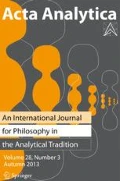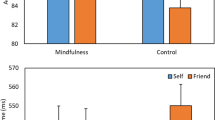Abstract
In Values and the Reflective Point of View (2006), Robert Dunn defends a certain expressivist view about evaluative beliefs from which some implications about self-knowledge are explicitly derived. He thus distinguishes between an observational and a deliberative attitude towards oneself, so that the latter involves a purely first-person point of view that gives rise to an especially authoritative, but wholly non-observational, kind of self-knowledge. Even though I sympathize with many aspects of Dunn's approach to evaluative beliefs and also with his stress on the practical significance of self-knowledge, I argue that his proposal seriously misinterprets the role of observation and evidence within the first-person point of view and, derivatively, in the formation of evaluative beliefs.
Similar content being viewed by others
Notes
It may follow from my line of reasoning that this contrast is not as sharp and clear-cut as one might assume in the light of the model of a pure, detached observer.
In a similar vein, Dunn concludes: “It's time to take stock. Expressivists draw a lesson from the way in which propositions about what's good, right, and so on, provide a focus for practical thought and talk. They hold that it indicates that evaluative thought is intrinsically practical” (Dunn 2006, p. 27).
"We understand what is distinctive about our evaluative states of mind by attending to the way in which the evaluatives that express their contents are especially apt as answers to questions what to choose or do, what to desire or how to feel… Evaluatives are distinctively apt to serve as answers to questions about what to choose, do, desire or feel because they are answers to questions that typically serve as the discursive transforms of these imperatival (or optative) questions.
The point can be put in terms of indistinguishability, or inseparability, of certain questions. Consider the question of whether to desire p: of whether p is to be desired. Suppose I take up this question in an object-focused way. In that case, I consider the question of whether to desire p in such a way that any reason for desiring p recommends desiring p by virtue of the way in which it recommends p (or the situation that p represents) as good, and hence is a first-order reason for desire” (Dunn 2006, p. 9).
“When I consider the (object-focused) question of whether to desire p, that question will be perspectivally 'transparent' with respect to the question of whether p is good (in some way): the first question will 'give way' to the second as the issue in focus, and the answer to the second question (whether p is good) will dictate an answer to the first (whether to desire p). In this way, the question whether p is good (in some respect) will come to do duty, in such a case, as the deliberative or discursive transform of the question of whether to desire p” (Dunn 2006, p. 10).
This appears to be so with regard to trivial intentions and decisions, like the decision to cook rabbit for dinner. It is not so clear that it holds, however, for more complex engagements and commitments. This further challenge to Dunn's position will be put aside in the present paper.
Moreover, once claims (a) and (b) have been distinguished, some may feel tempted to deny claim (a) even with regard to trivial intentions and argue that the answer to the question 'how did I answer deliberative question p?' must be based on an observational attitude towards oneself. This is certainly a further perplexity that I must also put aside insofar as it may not affect my challenge to claim (b).
In a similar vein, "… It surely is a mistake to suppose that our desires 'fill the foreground' of practical deliberation. For one thing, the phenomenology of reflection doesn't lend any support to the idea that we are self-preoccupied like this as practical deliberators. The situation is at least very often as Blackburn depicts it: we consider this and that, where this and that are the various features that weigh with us as we try to decide what to do" (Dunn 2006, p. 89).
Even though I have seen no place where Dunn would make this claim, it sounds like a rather uncontroversial attribution; especially if we take into consideration that he argues that the perverse agent regards her acts as good, not with regard to any substantive theory of the good, but in a merely formal sense: "it is good in so far as it realizes (or conduces to the realization) of a current end-in-view. Goodness in action, in this sense, is grounded in success in action (or the promotion thereof) with respect to a present desire. On the other hand, to count an act as good in a serious or substantive way is to count the act as good in terms that are independent of its being (or conducing to) the fulfillment of any current end-in-view. Goodness in action in a serious or substantive sense is end-justifying: we justify our ends-in-view by reference to their (in this sense) good-making features" (Dunn 2006, pp. 76–7).
Bernard Williams explores the notion of acknowledgment in an attempt to articulate a reasonable view about what may count as an authentic life: “A relevant notion here is acknowledgement. Someone may come to acknowledge a certain affiliation as an identity, and this is neither a mere discovery nor, certainly, a mere decision. It is as though he were forced to recognize the authority of this identity as giving a structure and a focus to his life and his outlook. There are circumstances in which what was earlier a mere recognition of fact may come to compel acknowledgement, as when many assimilationist Jews in the 1930s came to acknowledge a Jewish and perhaps a Zionist identity under the thought that there was no way in which without evasion they could go on as though it made no difference that they were Jewish people" (Williams 2002, p. 203; my emphasis). I regard this notion as quite appropriate to express the kind of commitment Helen's last sentence may be interpreted to involve. For further elaboration of this notion of acknowledgment, see Corbí (2010, part II).
In either case, there will be some pressure in the direction of a certain counterfactual situation, namely, whether rejection of her love for Harry would have eventually had a positive effect on her life.
There is no much talk in Dunn's book about perception. In fact, he wants his use of 'observational' to be uncommitted as to whether it amounts to 'perceptual' or not: “In these terms, my first-person knowledge that I am in pain, in such a case, is observational just in that it is evidential. It is left open whether such phenomenological self-knowledge (which may be said to be based on introspective evidence) is perceptual or quasi-perceptual” (Dunn 2006, pp. 37–8). It is quite surprising that such a significant matter should only deserve this short remark in a footnote. It is clear to me, however, that at least some types of observation essentially involve perception and also that perception is a privileged locus for the contrast between figure and ground, so essential to Dunn's view. This is why I talk relentlessly of perception and not only of observation. Yet, if some people would rather stick to Dunn's alleged neutrality on this matter, they might easily restate my references to perceptions in terms of observation.
And seems to grant this point as well, at least insofar as the pursuit of the good is concerned (see Dunn 2006, pp. 86–7).
References
Blackburn, S. (1998). Ruling passions. A theory of practical reasoning. Oxford: Oxford University Press.
Corbí, J. E. (2010). First-person authority and self-knowledge as an achievement. European Journal of Philosophy, v.18(3), 325–362.
Corbí, J. E. (forthcoming), Morality, self-knowledge, and human suffering. An essay on the confidence in the world. New York, Routledge.
Dunn, R. (2006). Values and the reflective point of view. On expressivism, self-knowledge, and agency. Aldershot: Ashgate.
Finkelstein, D. (2003). Expression and the inner. Cambridge, Mass: Harvard University Press.
Moran, R. (2001). Authority and estrangement. Princeton: Princeton University Press.
Smith, M. (1994). The moral problem. Oxford: Blackwell.
Williams, B. (2002). Truth and truthfulness. Princeton: Princeton University Press.
Acknowledgments
I must thank Ignacio Ávila, Diego Lawler, Jesús Vega, and Agustín Vicente for detailed comments on a draft version of this paper, which is, in turn, based on research generously funded by the Spanish Ministry of Science and Innovation: HUM2006-08236, PR2008-0221, CSD00C-09-62102, and FFI2010-16049.
Author information
Authors and Affiliations
Corresponding author
Rights and permissions
About this article
Cite this article
Corbí, J.E. Observation, Character, and A Purely First-Person Point of View. Acta Anal 26, 311–328 (2011). https://doi.org/10.1007/s12136-011-0124-2
Received:
Accepted:
Published:
Issue Date:
DOI: https://doi.org/10.1007/s12136-011-0124-2




